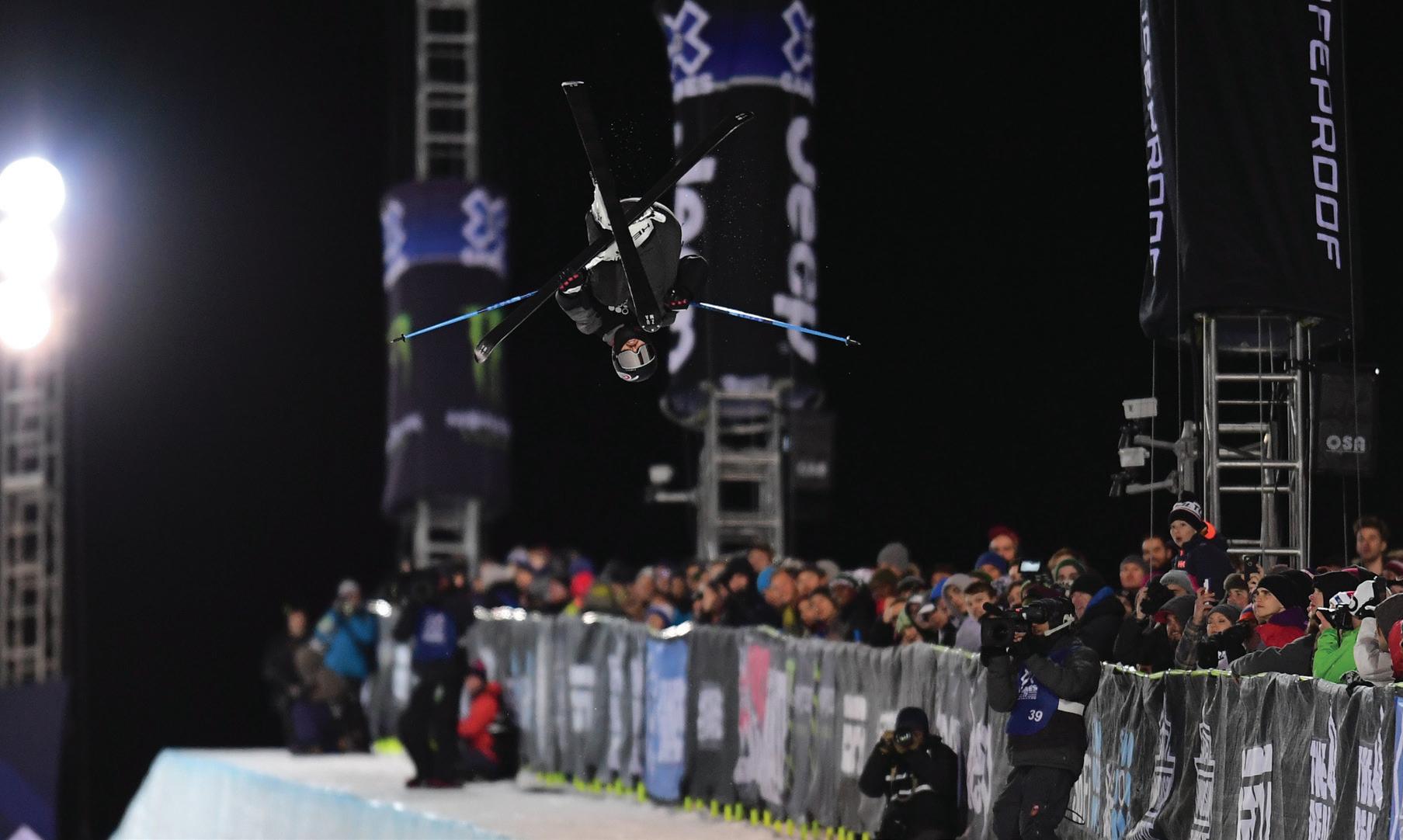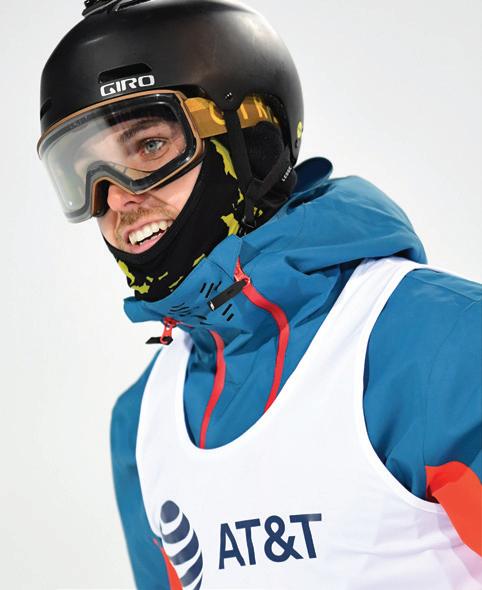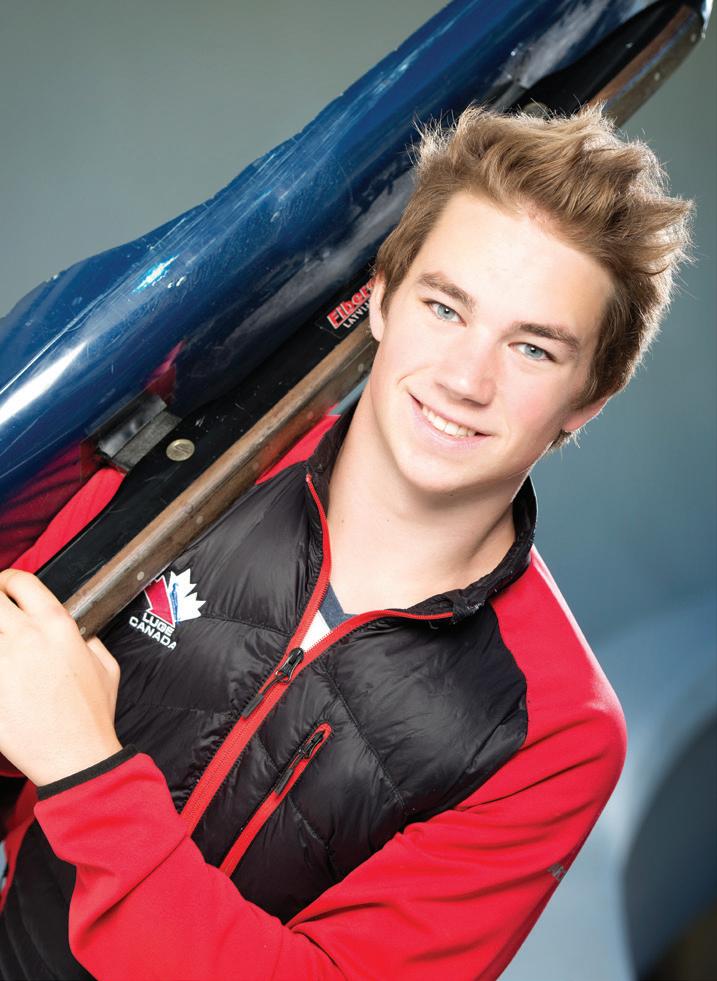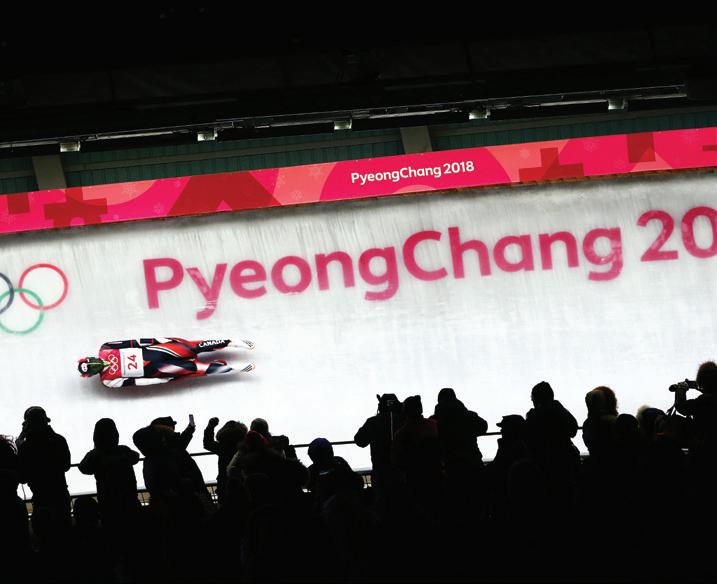
6 minute read
FACES OF WHISTLER: Gearing up for the Games
GEARING UP FOR THE GAMES
MEMORIES OF THE 2010 OLYMPIC GAMES IN WHISTLER STILL RESONATE WITH LOCAL ATHLETES
Advertisement
STORY BY BRADEN DUPUIS
Talking to some of the current crop of elite Whistler athletes, there’s a clear common denominator. Whatever sport they excel at, they all point to the 2010 Games in their hometown as the catalyst that pushed them to the next level.
“Being able to watch people I grew up looking up to, like Ashleigh McIvor or Mercedes [Nicoll], or Mike and Britt Janyk, watching them compete in person, and having them do so well, you kind of realized, ‘Well, if that person can win Olympic gold, maybe I can do that someday,’” says ski-cross racer MARIELLE THOMPSON. “It makes it a bit closer.”
Now 29 years old, Thompson was just 18 when the 2010 Games illuminated her hometown. Four years later, she realized her own Olympic dream, taking gold at the Games in Sochi, Russia.
Just four months before the 2018 Games in PyeongChang, South Korea, Thompson ruptured her ACL and MCL in a training run in Switzerland, and looked like she might miss her chance at a repeat. But, an innovative surgical procedure and an intense rehab regimen allowed her to line up in the starting gate to defend her gold. Her 17th place finish wasn’t the result she wanted, but the experience of her second Games alone was invaluable. >>
PENTAPHOTO
ABOVE: MARIELLE THOMPSON WINS THE OVERALL SKI CROSS WORLD CUP IN LA PLAGNE, FRANCE. MARIELLE THOMPSON

– SIMON D’ARTOIS
“having gone to two olympics, and having very different polar experiences, it’s only as much pressure as you really put on yourself,” she says.
“As much as it isn’t another race, it kind of is at the same time. So you have to ground yourself a little bit in that.”
After undergoing an ACL reconstruction surgery in March 2021, Thompson spent much of the year working on rehab, and feels ready for the 2022 Games in Beijing, China, which kicks off February 4.
“Everything at the Olympics is just bigger, and there’s a lot more of a spotlight on amateur sport than there ever is any other year,” she says. “Right now I just want to hopefully get there and get back on my skis. I’m not putting any pressure on myself, but any time I go into a race I want to win, so I wouldn’t want to go and not do my best and leave it all out there.” SIMON D’ARTOIS
While he wasn’t an official competitor, half-pipe skier Simon d’Artois was able to ski every night of the 2010 Games in Whistler.
The now-29-year-old Whistlerite helped wow international crowds on a nightly basis at the famous Fire and Ice Show on Whistler Mountain, where skiers dazzle guests with their feats, skiing through burning rings of fire.
“I don’t really know if at that point I was thinking [about competing in the Olympics myself]. I think at the time I was probably like, ‘This is pretty sweet—this is the closest I’m going to get to skiing at the Olympics,’” d’Artois says. “But then it slowly started to morph into something else.”
When he was first starting out, ending up a professional skier in Whistler would have been a satisfying career arc, d’Artois said. Then freestyle disciplines started

TOP AND ABOVE: SIMON D'ARTOIS COMPETING IN LIFEPROOF MEN'S SKI SUPERPIPE DURING X GAMES IN ASPEN IN 2018.

DAVID BUZZARD

VAUGHN RIDLEY/COC
TOP: REID WATTS WITH HIS LUGE. ABOVE: REID WATTS COMPETES IN RUN 3 OF THE MEN'S SINGLES LUGE DURING THE 2018 OLYMPIC WINTER GAMES IN PYEONGCHANG, SOUTH KOREA ON FEBRUARY 11, 2018. to grow in popularity. When halfpipe skiing was approved for the Olympics by the International Olympic Committee in June 2010, and d’Artois made Canada’s national team in 2012, the dream became something much more tangible.
“I didn’t make the first Olympics [in 2014] but I was extremely close, and that was a very real realization that I would be able to do it the next time around,” he says.
Though his 13th place finish at the 2018 Games wasn’t what he had hoped for, reaching the premier event in his sport in itself was “a dream come true,” d’Artois adds. “It’s just exciting to push myself and see what I can achieve. The Olympics and all the events leading up to it are just a great experience and gift in itself,” he says.
“So yeah, it means everything— but you also can’t let it consume you too much, you know? You still have to balance it with real life.”
D’Artois credits the support of the Whistler community— from family and friends to local businesses—for helping young athletes like himself realize their athletic aspirations.
“They give the support to make peoples’ dreams come true, and have Whistler kids achieve their goals, and I’m always appreciative and very grateful and thankful to be a part of this community,” he says.
But being able to witness the Olympics firsthand in your own backyard plays a part too.
“Growing up and seeing it on TV in different towns and cities around the world was really cool,” d’Artois says. “To have it happening in your own town was very surreal.”
REID WATTS
While Thompson and d’Artois graduated high school together when the 2010 Games came to town, the dream was already starting to take shape for Whistler’s younger generations, too.
Reid Watts—who competed in his first Olympics at the 2018 Games—was just 11 years old when the Olympics came to Whistler.
“I had just done my first season of luge in the developmental stage, and yeah, just watching the 2010 Games out here … the vibe was just so electric everywhere,” Watts recalls. “That was really the driving force into what made me have the drive to keep going all these years.”
Watts finished 12th in his first Olympics four years ago (not bad at all for a 19-year-old on the biggest stage of them all)—a result he’s working hard to improve on ahead of the 2022 Games in China.
“There’s been a lot of peaks and valleys these last three years of my racing since the last Olympics. At the end of last race season, I started to make some big gains, but it was a little too little too late, and the race season ended,” he says. “So of course I’d like to just get back on the sled, hit the ground running on what we really worked on and [what] made [me] fast last year, and start to really dial it in.”
With one eye on the 2022 Games, Watts hasn’t forgotten the experience of his first Olympics in Korea four years ago.
“Still to this day I have to say that was the race of my life, and it was just such a special moment to me, being able to put it down when it mattered the most,” he says. “After watching the 2010 Olympics here as a kid growing up, it was everything that I imagined it would be—just such an honour, and so special.”
While Whistler’s next generation of top-tier athletes won’t have the thrill of watching the Games in their hometown to inspire them, they can still take inspiration from the current crop of Olympians.
Watts’ advice for them? Just have fun with it.
“That’s the biggest piece. Always remember why you started, and just keep having fun,” he says. “There’s nothing really much more fun than strapping yourself on a sled and going down an icy chute really fast, right? It’s as good as it gets.” W







